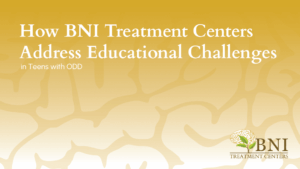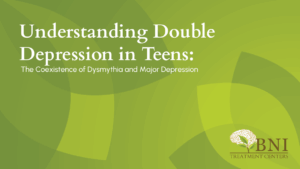There are abundant reasons why a teenager might seem to be in the throes of emotional distress. These tumultuous years are, at the least, marked by moodiness and drama, and by depression and social anxiety at the more serious end. Hormonal fluctuations, school-related stressors, social issues, and difficult family events such as a divorce or death in the family, can all result in a teen’s mood swings and symptoms of distress. However, when a teen is experiencing serious signs of mental distress it is important to have him or her assessed by a professional mental health provider.
Too often, adolescents in distress turn to unhealthy measures to self-medicate or manage emotional strife. Recreational drug or alcohol abuse, promiscuous sex, or high-risk behaviors can be signs that a teen is crying out for help. Acknowledging these signs and proactively seeking help for the teen is the appropriate course of action, as putting one’s head in the sand could have disastrous effects. Teen suicide rates have ratcheted up significantly in the recent years, and was the second leading cause of death among youth ages 12-18 in 2016, according to the National Institute of Mental Health. Each day more than 3,700 suicide attempts are made by teens 14-18 years of age.
When a troubled teen is exhibiting signs of erratic behavior or emotional instability they should be assessed by a psychiatric professional. Teenage psychiatric evaluation involves a variety of screening tools designed to help the doctor arrive at a diagnosis and then design a treatment plan. In the event of a psychiatric crisis the teen would need acute stabilization services initially, with therapy to follow once the condition is stabilized. Teenage psychiatric evaluation and stabilization are services provided at a residential teen mental health center, which can provide the safe, supportive environment that will foster emotional healing.
What Are the Signs a Teen is In Emotional Distress?
Because of the emotional complexities common during the teen years, it isn’t always easy to determine if your child is just behaving age-appropriately or is in some kind of serious distress. Teens tend to keep their problems to themselves, often avoiding family and friends when they are struggling with emotional problems. Sometimes it is through one of the teen’s friends or a teacher that you first become aware that something is seriously wrong.
There are some classic signs and symptoms that indicate an adolescent is in psychological turmoil. Different mental health disorders have their own specific diagnostic criteria, but some of the more general symptoms include:
- Excessive worry or fear
- Excessive sleeping or insomnia
- Changes in eating habits, significant weight changes
- Extreme mood swings
- Exhibiting angry outbursts and irritability
- Avoiding contact with friends and family
- Avoiding activities once enjoyed
- Prolonged low mood, feelings of sadness and despair
- Signs of detachment
- Sudden decline in academic performance
- Struggles to perform typical daily tasks or routine activities
- Substance abuse
- Nightmares
- Difficulty perceiving reality
- Somatic (physical) symptoms, such as headaches or stomach distress
- Talk of suicide
When a teen is exhibiting multiple signs of distress, it is best to reach out to your primary provider first to rule out a medical condition that might be responsible for the symptoms.
What is involved in a Teenage Psychiatric Evaluation?
When a teen shows signs of emotional and/or behavioral problems that are not related to a physical condition, they will be referred to a child psychiatrist who can then perform the routine psychological screening tools and an interview to arrive at a diagnosis. Teenage psychiatric evaluations might include:
- A thorough description of the symptoms and related emotional and behavioral problems
- A thorough health history, including medical and psychiatric. This will include a list of any medications the teen has been taking
- Family history, both medical and psychiatric
- Information about the teen’s development
- Information about family dynamic and interpersonal family relationships
- Information about the teen’s school situation and friends
- Interviews of the teen and the parents
- Any special assessments as deemed necessary for diagnosis
Based on this psychiatric evaluation, the psychiatrist will consider the biological, psychological, and social factors involved and arrive at a formal diagnosis.
What is Acute Stabilization?
In extreme cases, the teen will be experiencing an acute psychiatric event, which can involve psychosis, hallucinations, delusions, or a danger of physical harm to themselves or someone else. In this case, the teen will need acute stabilization services. A residential teen mental health facility will provide a secure, safe environment for the teen to stabilize. This setting will provide the highest level of treatment for the teen in crisis.
Stabilization will involve a review of any current medications and any relevant information regarding the acute event. A team of psychiatrists, therapists, and nurses will ensure that the teen is kept calm and safe while under constant supervision.
Treatment in a Residential Teen Mental Health Program
A residential mental health treatment program for teens allows the adolescent to receive the constant therapeutic support needed to heal and move forward and reintegrate to their regular life. Recovering from a mental health disorder takes time and a variety of therapies and activities that help the teen overcome the difficulties caused by the disorder. The treatment elements include:
- Individual psychotherapy
- Group therapy sessions with other teens
- Family therapy
- Medication management
- Academic tutoring
- Recreational therapies
After Discharge, Then What?
Once the treatment period has been completed and the teen is stabilized, it is time for the discharge process. Certain plans are put in place at discharge so the teen can continue to receive support on an outpatient basis. Referrals to a local therapist or psychiatrist will be made, and the family will also have instructions for managing the emotional needs of their teens moving forward.
BNI Treatment Provides Teenage Psychiatric Evaluation and Stabilization
BNI Treatment is a Los Angeles-based residential mental health treatment program for adolescents ages 12-17. At BNI Treatment, teens are treated with respect and compassion as they work toward resolving mental health issues and improving their quality of life. BNI Treatment is owned and operated by two psychiatrists who have specialized in adolescent psychiatry, understanding the unique features that teen mental health disorders present. For more information about the program, please contact BNI Treatment today at (888) 522-1504.




